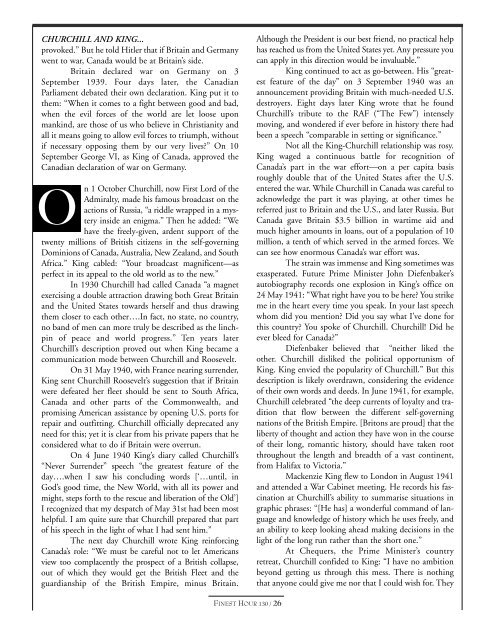SPRING 2006 ⢠NUMBER 130 - Winston Churchill
SPRING 2006 ⢠NUMBER 130 - Winston Churchill
SPRING 2006 ⢠NUMBER 130 - Winston Churchill
- No tags were found...
Create successful ePaper yourself
Turn your PDF publications into a flip-book with our unique Google optimized e-Paper software.
CHURCHILL AND KING...provoked.” But he told Hitler that if Britain and Germanywent to war, Canada would be at Britain’s side.Britain declared war on Germany on 3September 1939. Four days later, the CanadianParliament debated their own declaration. King put it tothem: “When it comes to a fight between good and bad,when the evil forces of the world are let loose uponmankind, are those of us who believe in Christianity andall it means going to allow evil forces to triumph, withoutif necessary opposing them by our very lives?” On 10September George VI, as King of Canada, approved theCanadian declaration of war on Germany.On 1 October <strong>Churchill</strong>, now First Lord of theAdmiralty, made his famous broadcast on theactions of Russia, “a riddle wrapped in a mysteryinside an enigma.” Then he added: “Wehave the freely-given, ardent support of thetwenty millions of British citizens in the self-governingDominions of Canada, Australia, New Zealand, and SouthAfrica.” King cabled: “Your broadcast magnificent—asperfect in its appeal to the old world as to the new.”In 1930 <strong>Churchill</strong> had called Canada “a magnetexercising a double attraction drawing both Great Britainand the United States towards herself and thus drawingthem closer to each other….In fact, no state, no country,no band of men can more truly be described as the linchpinof peace and world progress.” Ten years later<strong>Churchill</strong>’s description proved out when King became acommunication mode between <strong>Churchill</strong> and Roosevelt.On 31 May 1940, with France nearing surrender,King sent <strong>Churchill</strong> Roosevelt’s suggestion that if Britainwere defeated her fleet should be sent to South Africa,Canada and other parts of the Commonwealth, andpromising American assistance by opening U.S. ports forrepair and outfitting. <strong>Churchill</strong> officially deprecated anyneed for this; yet it is clear from his private papers that heconsidered what to do if Britain were overrun.On 4 June 1940 King’s diary called <strong>Churchill</strong>’s“Never Surrender” speech “the greatest feature of theday….when I saw his concluding words [‘…until, inGod’s good time, the New World, with all its power andmight, steps forth to the rescue and liberation of the Old’]I recognized that my despatch of May 31st had been mosthelpful. I am quite sure that <strong>Churchill</strong> prepared that partof his speech in the light of what I had sent him.”The next day <strong>Churchill</strong> wrote King reinforcingCanada’s role: “We must be careful not to let Americansview too complacently the prospect of a British collapse,out of which they would get the British Fleet and theguardianship of the British Empire, minus Britain.Although the President is our best friend, no practical helphas reached us from the United States yet. Any pressure youcan apply in this direction would be invaluable.”King continued to act as go-between. His “greatestfeature of the day” on 3 September 1940 was anannouncement providing Britain with much-needed U.S.destroyers. Eight days later King wrote that he found<strong>Churchill</strong>’s tribute to the RAF (“The Few”) intenselymoving, and wondered if ever before in history there hadbeen a speech “comparable in setting or significance.”Not all the King-<strong>Churchill</strong> relationship was rosy.King waged a continuous battle for recognition ofCanada’s part in the war effort—on a per capita basisroughly double that of the United States after the U.S.entered the war. While <strong>Churchill</strong> in Canada was careful toacknowledge the part it was playing, at other times hereferred just to Britain and the U.S., and later Russia. ButCanada gave Britain $3.5 billion in wartime aid andmuch higher amounts in loans, out of a population of 10million, a tenth of which served in the armed forces. Wecan see how enormous Canada’s war effort was.The strain was immense and King sometimes wasexasperated. Future Prime Minister John Diefenbaker’sautobiography records one explosion in King’s office on24 May 1941: “What right have you to be here? You strikeme in the heart every time you speak. In your last speechwhom did you mention? Did you say what I’ve done forthis country? You spoke of <strong>Churchill</strong>. <strong>Churchill</strong>! Did heever bleed for Canada?”Diefenbaker believed that “neither liked theother. <strong>Churchill</strong> disliked the political opportunism ofKing. King envied the popularity of <strong>Churchill</strong>.” But thisdescription is likely overdrawn, considering the evidenceof their own words and deeds. In June 1941, for example,<strong>Churchill</strong> celebrated “the deep currents of loyalty and traditionthat flow between the different self-governingnations of the British Empire. [Britons are proud] that theliberty of thought and action they have won in the courseof their long, romantic history, should have taken rootthroughout the length and breadth of a vast continent,from Halifax to Victoria.”Mackenzie King flew to London in August 1941and attended a War Cabinet meeting. He records his fascinationat <strong>Churchill</strong>’s ability to summarise situations ingraphic phrases: “[He has] a wonderful command of languageand knowledge of history which he uses freely, andan ability to keep looking ahead making decisions in thelight of the long run rather than the short one.”At Chequers, the Prime Minister’s countryretreat, <strong>Churchill</strong> confided to King: “I have no ambitionbeyond getting us through this mess. There is nothingthat anyone could give me nor that I could wish for. TheyFINEST HOUR <strong>130</strong> / 26
















